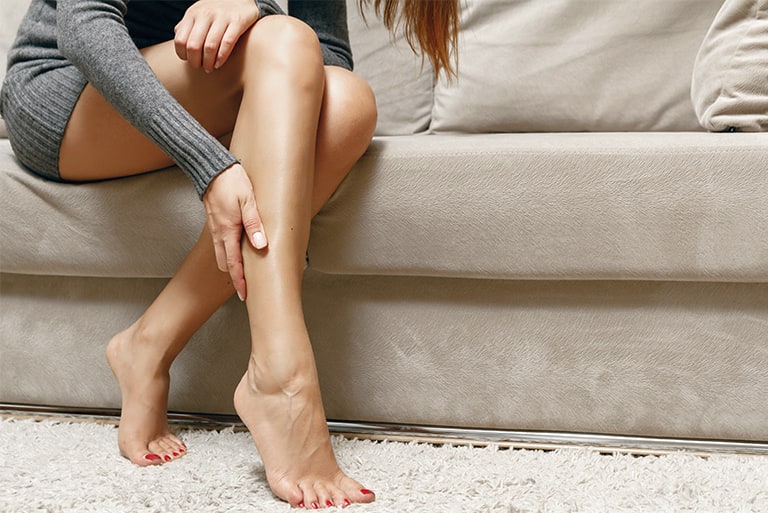Why do we get varicose veins?
Varicose veins are a real curse for many women – especially in summer – because the meandering bulges on their legs attract unwanted glances. But how do these vein mutations develop in the first place and what are the causes behind them?

Where do varicose veins come from?
Added to that there is a functional disorder of the venous valves, which basically seal a vein like a valve should, in order to prevent the blood from flowing back down. As a result, the blood which was pumped upwards drops back down and intensifies the congestion. The walls of your veins increasingly lose elasticity and expand, which is why the varicose veins become clearly visible under the skin surface of your legs.Varicose veins do not appear overnight. Varicosis, as it is also known, is a chronic disease of the veins, which develops over a longer period if it is not tackled early enough. The first symptoms can be swollen legs or spider veins, which hardly cause symptoms but should not be ignored and may need to be treated.
What are the causes of varicose veins?
Nobody wants to have these unsightly, protruding veins on their legs, but they cannot always be prevented. We are born with many causes and they can only be influenced to a limited extent:
- Predisposition: in most cases, a genetic weakness of the connective tissue lies behind varicosis, which in the passage of time can lead to venous insufficiency and with it facilitate the development of varicose veins.
- Hormones: hormonal swings are also often the reason for unloved varices, which particularly affect women. During the menstrual cycle, a pregnancy and the menopause – hormonal levels change on a regular basis, which also alter the composition of connective tissue.
- Age: as you get older, your tissue also loses elasticity and your blood vessels are no longer as stable as they once were.
- Other diseases: very rarely other diseases are the source of varicose veins, e.g. heart failure.
Risk factors for varicose veins
There are other risk factors for varicose veins which can however be avoided:
- Inactivity: being seated at a desk all day and then in the evening lying on the sofa and watching television – what sounds for many like a cosy daily routine is pure poison for your veins: because they want movement, and as much as possible. It is their job to pump the oxygen-poor blood out of your legs and upwards back towards your heart. A real challenge if there is no support from outside. Because our veins can only manage this difficult task when the muscle pump is in action. That means: when the leg muscles – in particular those in the calves – are activated, the blood flow against gravity operates. That is why your veins definitely need exercise, in order to be able to perform their job reliably.
- Excess weight: excess weight is usually the result of too little exercise and too much unhealthy nutrition. That also has a negative effect on the function of your veins. Excess weight makes blood transportation more difficult and should be urgently reduced in order to relieve your veins and to prevent other venous diseases.
- Sitting: sitting too much is a part of modern life. In the office, in the car, in the plane – many people spend the largest part of the day seated. Not a good condition for your vein function, which is only stimulated by movement. Prolonged standing can also encourage the build-up of blood in your legs.
- Lack of fluids: if your body is given sufficient fluids every day, your blood can circulate unhindered through it. The less fluids are consumed during the day, the thicker your blood will be. Particularly the return transportation out of your legs then becomes increasingly difficult and your veins are quickly overwhelmed.
- Smoking: smoking causes circulation problems. That, in turn, increases the risk of thrombosis, among other things.
- Alcohol: alcohol consumption expands your blood vessels and therefore encourages the accumulation of fluid, especially in your legs.
- Tight clothes: clothes or socks which are too tight, which cut into your calves, limit blood flow in the superficial veins. A build-up of blood is created if your blood cannot be efficiently pumped upwards.
It is hard to compete against a family predisposition with preventive measures. However, people who are prone due to their parents or grandparents can support their veins through a healthy lifestyle with lots of exercise, sufficient consumption of fluids, a diet rich in vital nutrients and medicines for stabilising their blood vessels, like Veno SL® 300, so that varicose veins do not appear at all. If the varices are already visible, a doctor should take a look at them and, depending on the diagnosis, start an appropriate therapy.